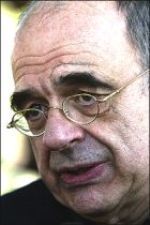UN, agencies relocate under threats in Darfur
By Opheera McDoom
KHARTOUM, March 16 (Reuters) – The United Nations has withdrawn all international staff in parts of the western Darfur region to a regional capital after Arab militias said they would target foreigners and U.N. convoys in the area, the top U.N. envoy in Sudan said on Wednesday.
 Jan Pronk told Reuters in an interview that the government had made small steps to disarm the militia, known locally as Janjaweed, in West Darfur state, but more had to be done.
Jan Pronk told Reuters in an interview that the government had made small steps to disarm the militia, known locally as Janjaweed, in West Darfur state, but more had to be done.
The Janjaweed stand accused of a campaign of rape, killing, looting and burning non-Arab villages.
“The Janjaweed militia have said that they will now target all foreigners and all U.N. humanitarian convoys so we have withdrawn all people to El-Geneina,” he said. The militias gave the warning to the drivers of seized U.N. trucks, he added.
All aid agency staff in the area — West Darfur state on the Chad border — have also pulled back to El-Geneina, which is the state capital, he said. In total, 44 staff were relocated.
Pronk said the threats probably arose because the governor of West Darfur state had demanded that all cars the government had given to the militia in the past be returned. U.N. security officials were assessing the threat.
The Khartoum government has admitted arming some militia to quell a rebellion launched in early 2003 but denies all links to the Janjaweed, calling them outlaws.
West Darfur had been relatively quiet in recent months while tensions were high in South Darfur state and parts of North Darfur. Tens of thousands of people have been killed during the rebellion and thousands die every month in camps which house the almost 2 million people who have fled their homes in Darfur.
REBEL GROUP ABANDONS CEASEFIRE
Darfur’s third rebel group, which splintered from the two main movements last year, said government forces had attacked villages and its camps in its West Darfur stronghold Jabel Moun on Wednesday, killing nine of their men and wounding three before withdrawing from the area.
Khalil Abdallah, the political secretary of the National Movement for Reform and Development (NMRD), told Reuters from Darfur fighting began early this morning and the group was moving into the villages in Jabel Moun to count the civilian casualties. “They attacked Armu and Alona,” he said.
“No we don’t respect this ceasefire anymore,” Abdallah said. He added the rebels had lost eight men in a government and Janjaweed attack on two NMRD camps east of Jabel Moun on Monday. “We have to defend ourselves.”
African Union forces mandated to monitor a shaky truce in place in Darfur since April 2004 confirmed the Monday attack, but said they could not confirm the casualties.
The U.N. Security Council has demanded that Sudan disarm the Arab militias, and Pronk said the government needed to take tough action against them.
“The government will have to take action politically and militarily against the Janjaweed,” Pronk said. But he said not much had been done yet.
Pronk berated the U.N. Security Council for failing to break a deadlock over a resolution on Sudan, saying those responsible for war crimes there needed to be brought to justice. If not, it would create a feeling of impunity for criminals and victims would lose faith in the international community.
“It is not responsible, in my opinion, to continue deliberating who is going to be the court,” he said.
The Security Council is divided over issues including imposing sanctions on Khartoum and whether to prosecute those suspected of Darfur war crimes in the International Criminal Court.
He said he was not worried about delays to a separate southern Sudan peace deal, which was signed in January to end more than two decades of civil war in the south of the country.
The former rebel group in the southern region, the Sudan People’s Liberation Movement (SPLM), was due to send an advance team to Khartoum on Tuesday, but postponed the move.
Pronk, a Dutch former minister, said the SPLM was finalising internal power issues, but he expected delegates to arrive in the coming weeks. “You have to transform a liberation movement … into a political movement,” he said.
